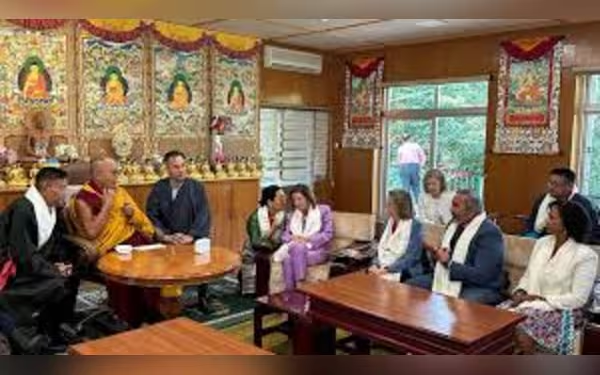Sunday, June 30, 2024 07:07 PM
US Congress Delegation Meets Dalai Lama Amid China Tensions
- Bipartisan US delegation visits Dalai Lama in Dharamshala, sparking China controversy
- US lawmakers engage in discussions with Tibetan government-in-exile officials on autonomy
- China criticizes US support for Tibetan self-determination amidst ongoing tensions
 Image Credits: thefrontierpost
Image Credits: thefrontierpostA recent visit by a bipartisan US Congressional delegation to the Dalai Lama in Dharamshala sparks controversy with China. Discussions on Tibetan autonomy and US support for self-determination amidst strained US-China relations.
A recent visit by a bipartisan delegation from the United States Congress to the Dalai Lama in Dharamshala, India has sparked controversy with China, which views the Tibetan spiritual leader as a threat to its sovereignty. This meeting comes at a crucial time, as relations between the US and China have been strained due to various issues including trade disputes, the COVID-19 pandemic, and military tensions in the South China Sea and Taiwan Strait.
The delegation, led by Rep. Michael McCaul and including former House Speaker Nancy Pelosi, engaged in discussions with Tibetan government-in-exile officials regarding autonomy for Tibet. This visit coincided with the passing of the Resolve Tibet Act by the US Congress, which aims to facilitate peaceful dialogue between the Dalai Lama and Chinese authorities.
Despite objections from the Chinese Communist Party, the US lawmakers proceeded with their visit, reaffirming American support for Tibetan self-determination. The impending signing of the bill by President Joe Biden underscores the US commitment to the Tibetan cause, drawing strong opposition from Beijing.
Chinese officials have criticized the Dalai Lama as a political figure posing as a religious leader, urging the US to avoid interactions with him. In contrast, the Dalai Lama advocates for Tibetan autonomy and the preservation of Buddhist culture, refuting claims of separatism.
As speculations arise about the Dalai Lama's upcoming medical trip to the US and potential meetings with American officials, China maintains its stance on Tibet, rejecting foreign involvement in what it considers internal affairs. India, while recognizing Tibet as part of China, offers sanctuary to Tibetan exiles, further complicating the geopolitical landscape of the region.
The meeting between the US Congressional delegation and the Dalai Lama highlights the ongoing tensions between the US and China over the issue of Tibet. As diplomatic dialogues continue, the future of Tibetan autonomy remains uncertain amidst conflicting perspectives and geopolitical complexities in the region.













